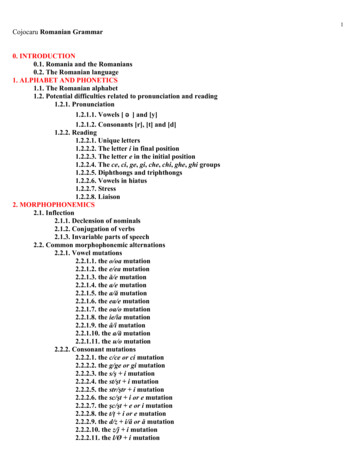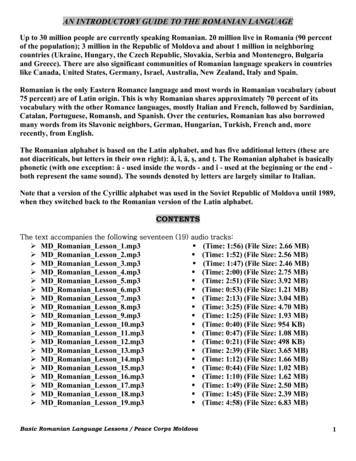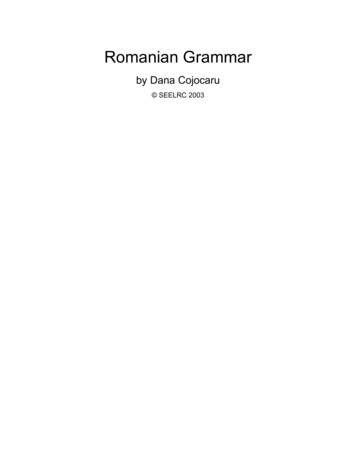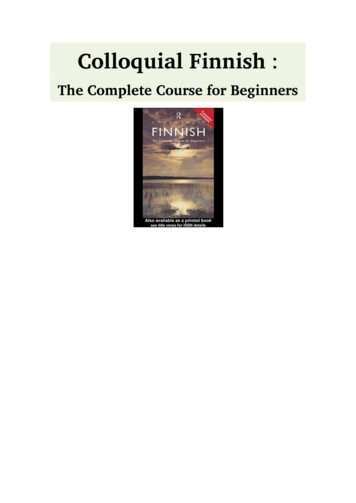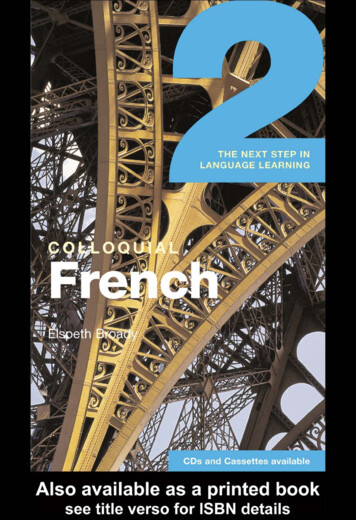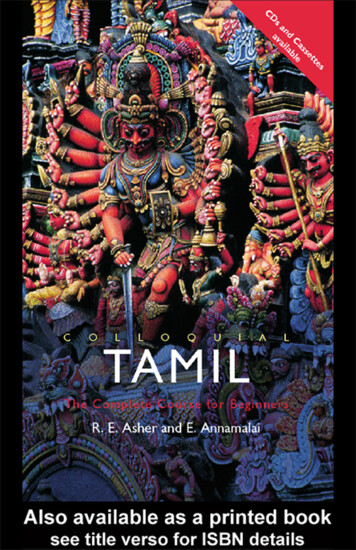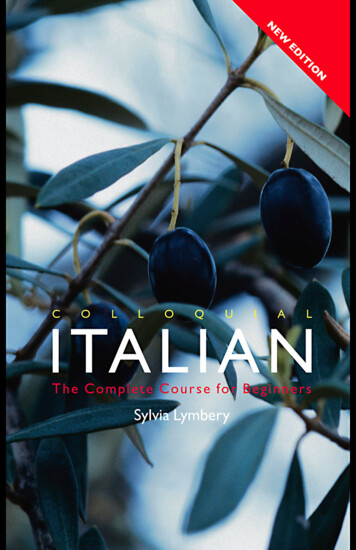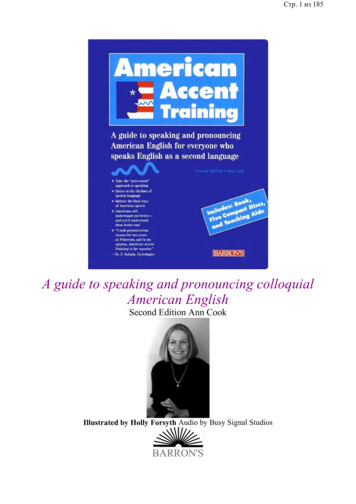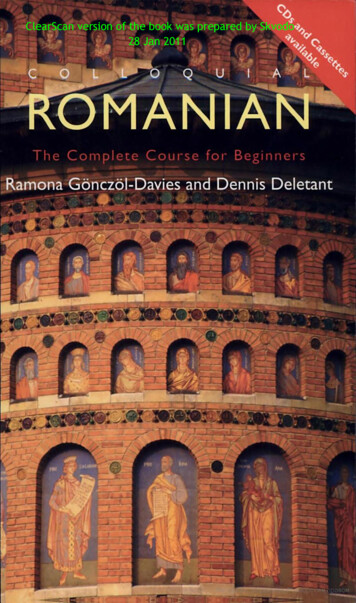
Transcription
ClearScan version of the book was prepared by Skvodo28 Jan 2011
The Col l oquia l SeriesSeries Adviser: Gary KingThe following languages are available in the Colloquial series:* AfrikaansItalian* Albanian* Japanese* Amharic* KoreanArabic (Levantine)* Arabic of Egypt* Latvian* LithuanianMalayArabic of the Gulfand Saudi Arabia* Mongolian* NorwegianBasquePanjabi* Breton* PersianBulgarian* Cambodian* Polish* Cantonese* Portuguese* Catalan* Portuguese of BraziI* Chinese* Romanian* Croatian and Serbian* Russian* Czech* Scottish Gaelic* Danish* Slovak* Dutch* SloveneSomali* English* Spanish* Estonian* Finnish* Spanish of Latin America* French* Swahili* German* Swedish* Greek* Tamil* ThaiGujarati* Hebrew* Turkish* Hindi* Ukrainian* HungarianUrduVietnamese* Welsh* Icelandic** lndonesianAccompanying cassette(s) (*and CDs) are available for all the abovetitles. They can be ordered through your bookseller, or send paymentwith order to Routledge Ltd, lTPS, Cheriton House, North Way,Andover, Hants SPlO SBE, or to Routledge loc,New York NY10016, USA.270 Madison Avenue,COLLOQUlAL CD-ROMsMultimedia Language CoursesAvailable in: Chinese, French, Portuguese and Spanish
ColloquialRomanianThe Complete Coursefor BeginnersThird EditionRamona Gonczol-Davies, Dennis DeletantI o ; n upLONDON AND NEW YORK
First published in 1983by Routledge & Kegan PaulReprinted in 1990,by Routledge1991and1992Second edition published in 1995Third edition published in 2002 reprinted 2004by Routledge2 Park Square, Milton Park, Oxon OX14 4RNSimultaneously published in the USA and Canadaby Routledge270 Madison Avenue, New York, NY 10016Routledge is an imprint of the Taylor &Francis GroupDennis Deletant, Ramona GonczOl-Davies1983, 1995, 2002Typeset in Times byFlorence Production Ltd, Stoodleigh, DevonPrinted and bound in Great Britain byBiddles Ltd, Guildford and King's LynnAH rights reserved. No part of this book may be reprinted orreproduced or utilised in any form or by any electronic,mechanical, or other means, now known or hereafter invented,including photocopying and recording, or in any informationstorage or retrieval system, without permission in writing fromthe publishers.British Library Cataloguing in Publication DataA catalogue record for this book is available from the BritishLibraryLibrary of Congress Cataloging in Publication DataA catalog record for this book has been 58
Co ntentsAcknowledgementsviiIntroductionix1Bună ziuaGood day2Bunvenit În RomâniaWelcome to Romania133În vacanţăOn holiday274Cât e ceasul?What's the time?395La resta urantAt the restaurant516Ti mpul probabilThe weather forecast657La poştăAt the Post Oftice778La cu mpărăturiGoing shopping909Vreau o maşină nouăBuying a new car1 0 RecapitulareRevision11011 16
vi1 1 Ceartă În fa milieTrouble at home1 261 2 PrieteniiFriendships1 411 3 La doctorA visit to the doctor1 531 4 Visu lThe dream1 691 5 La piaţăAt the market1 881 6 BârfăGossip20 11 7 SporturiSports21 51 8 O casă nouăA new house2291 9 O povesteBedtime story24320 RecapitulareRevision252Key to exercisesRomanian verb tableRomanian-English glossaryE nglish-Romanian glossary258278296314
Ackn owledgementsA word of thanks to Ben Crampton on whom we tried out thiscourse. His feedback alongside that from Andrea Deletant,Ruxandra Trandafoiu, Radu Borza and Richard Davies, was im mensely valuable, inc1uding identification of a number of mis spellings in the typescript. If there are any others, they are the faultof the authors. Comments from users of the book are welcome.
I ntroductio nRomanian is a Romance language spoken in Romania, the Re public of Moldova, and in parts of Serbia and Hungary borderingon Romania. Almost ninety per cent of Romania's population of23 million has Romanian as their mother tongue and a further2.8 million native Romanian-speakers represent 65 per cent of thepopulation of the Republic of Moldova.Romanian or Daco-Romanian (so-named because its develop ment is associated with the Roman province of Dacia ) is a Latinlanguage and is one of four varieties of the sub-group of Romanceknown as Balkan Romance. The other three are: Aromanianor Macedo-Romanian, spoken in a number of communities innorthern Greece and Albania; Megleno-Romanian, spoken in asmaU are a north of Thessaloniki; and Istro-Romanian, spoken ina very smaU number of villages in the Istrian peninsula on theAdriatic. AU four varieties are considered to have developed fromthe Latin spoken in the area of the Balkans covered by the Romanprovinces of Dacia, Moesia and Illyricum, their separation beingcaused by the intrusion of the Slavs in the sixth and seventhcenturies.Ori g i nsThe Roman emperor Trajan conquered Dacia in campaigns lastingfrom AD 105 to 107 and colonized it with settlers from aU parts ofthe Empire, who intermarried with the local population, thusproducing the Daco-Roman people who were the forebears of theRomanians. After Dacia was abandoned by the Romans in AD 271 ,i t became a battleground and gateway t o the south for successiveinvaders, amongst them the Slavs. The Slavs who settled north ofthe Danube, in the are a of present-day Romania, were assimilatedby the Romance-speaking population. After the seventh century,
xany reference to, or trace of, the Romance-speaking populationboth south and north of the Danube is extremely rare. Twoseventh-century chroniclers, writing in Greek (and both using thesame original text) mention a soldier in the Byzantine army whospoke these words in his native language: Toma, toma, Jratre. Thephrase, connected with an event during a campaign in Thrace in587, is believed to be the earliest evidence of Balkan Romance.Thereafter the history of Romanian falls silent for almost a thou sand years.The earliest text in Romanian to have been dated is a letter of1521 . Contacts with the Slavs south of the Danube in the four teenth century resulted in the first durable cultural links and, viathese links, in a Slavonic garb, the Romanians received from theByzantine Empire its religion, art, literature and, in the revisedCyrillic form, its alphabet. UntiI the seventeenth century thelanguage of the Romanians' literary culture was Church Slavonic.Romanian, when used, was written in the Cyrillic alphabet. At theend of the eighteenth century a Latinist movement amongst theeducated Romanian clergy of the Greek Catholic (Uniate) Churchin Transylvania encouraged the use of the Roman alphabet in placeof the Cyrillic, and at the same time attempted to 'reLatinize'Romanian vocabulary by introducing an etymological spellingsystem that rendered Romanian soare 'sun' by sole. The systemhad little impact on the Romanian writers of Muntenia andMoldavia who - aware of their linguistic ties with the WesternRomance languages (in particular with French and Italian) - duringthe second and third decades of the nineteenth century sought to'modernize' the language by importing new words from French andItalian and adapting them to the contemporary structures ofRomanian. The practical problem of matching the sounds ofRomanian with the Cyrillic alphabet led, via transitional alphabetsin the first half of the century, to the abandonment of the Cyrillicin favour of the Roman alphabet in the 1860s.Romanian today is written and printed in the Roman alphabetwith three diacritics (untiI 1989 the Romanian used in what wasthen Soviet Moldova - now the Republic of Moldova - was writtenand printed in a form of the Russian Cyrillic alphabet). In viewof the relatively recent adoption of the present Romanian alphabetthere has been little time for the written and spoken languages todiverge. Romanian can be divided into a number of (sub)dialects.The principal forms are Wallachian and Moldavian, spoken in theformer principalities of Muntenia or Wallachia (in the south-east)
and Moldavia (in the north-east). Other dialects are found in thenorth and centre of Transylvania. During the nineteenth centurya convergence of factors led Wallachian to be adopted as theliterary standard: the most prolific of the language reformers wasWallachian - he owned his own printing press to propagate hisideas - and it was the Wallachian town of Bucharest which becamethe capital of the modern Romanian state in 1 859.The modern l a n g u ageThe isolation o f Romanian has given rise t o a number o f featuresthat distinguish it from the other Romance languages. The vowelsystem is notable for the presence of ă and î, both central vowels,whose origins have occasioned much controversy - one schoolclaiming that they derive from the Daco-Thracian substratum,the other that they result from a system of accentuation commonto several B alkan languages. AIso, alone amongst the Romancelanguages, Romanian has preserved three distinct case forms (voca tive, nominative/accusative, and genitive/dative) and has a suffixeddefinite article: e.g cartea (lit. 'book the'). Adj ectives follow thepattern of the nouns and agree in number, gender and case. Thereare four verb conj ugations, closely related to those of classicalLatin. The present subjunctive shares the forms of the indicative,except in the third person, and is always introduced by the subor dinating particle să. The basic word order is: subject-verb-obj ect.Yes/no questions are usually indicated by a change in intonation,but inversion of subject and verb is an option.The Romanian alphabet mAs we have said, Romanian uses the Roman alphabet. Its orthog raphy is mainly phonemic: i.e., each letter represents the samesound in any word in which it occurs, with only a very few excep tions.Here is a table of the 31 letters of the Romanian alphabet intheir proper alphabetical order. Each letter is accompanied by anEnglish word containing much the same sound; a Romanian wordthat uses the letter; and the Romanian pronunciation of the nameof the letter.xi
xiiLetterSounds likeEnglishExample(Lettername)aăâb!!dbettera cross betweenrude and reedh agS otgogl tfoggardenheapsicka cross betweenrude and reedplea urekilogramlegmothernightcQrksI!ot!l,uickrapid, but trilled,as in Scots altshameslopca moonyisit hitemix)'.et?;ebranas (nose)casă (house)când (when)(a)(euh)âbun (good)bec (light bulb)dinte (tooth)lemn (wood)fată (girl)grădină (garden)hartă (map)mic (smalt)în (in)(be)(ce)(de)(e)(fe)(ge)(ha)(ee)îjoc (game)kilometru (kilometre)lege (law)modern (modern)nod (knot)pom (tree)pat (bed)quaker (quaker)repede (fast)(zhe)(ka)(le)(me)(ne)(o)(pe)(kju)(re)sare (salt)şa (saddle)timp (time)ţară (country)cu (with)valoare (value)whisky (whisky)xilofon (xylophone)Yale (lock)zonă (zone)(se)(she)(te)(tse)(u)(ve)(dublu , q, w and y occur only in borrowed words and proper nouns,e.g. kilometru, quaker, whisky, Yale. Â is equivalent to î.
The following combinations of letters also exist in Romanian:ce, ci, che, ehi, ge, gi, ghe, ghi. They and the sounds they repre sent are covered below.Pronunciation, intonation and stressYour best guide to Romanian pronunciation is the cassette accom panying this textbook where you will hear the language used bynative speakers. The tips given here can offer only an approxima tion of the sounds of Romanian.Intonation is basically similar to that of English.There is no written accent or sign for stress in Romanian orthog raphy and there is no rigid rule as to the position of a stressedsyllable in a word. However, the stressed syllable is always constantin the various forms of the noun ( i.e. it does not change when thedefinite artic1e is suffixed ) .VowelsThe letter a is similar to the Standard English vowel sound in 'bud'and 'come':acavemneedlewe havenaspatnosebedĂ differs in quality from a, being a less open sound. It is similarto the Standard English vowel sound in 'hearse ', 'nurse' and xcept in a few instances ă does not occur in a stressed syllable.E is similar to the Standard English vowel sound in 'dead', 'let'and 'red':beccartelight-bulbbooklemnsemnwoodsignxiii
xivThe letter i can represent three sounds:1. Most often it resembles English 'ee' in such words as 'keep'or 'seen':linmicgentlysmallpinseninpine treebright2. At the end of a word, when unstressed and not accompaniedby another vowel, i has the value of a scarcely audible ( However, an unstressed final i that is preceded by a conso nant plus l or r is pronounced as a full vowel - that is, as in1 . above:socriparents in-Iawsufliyou blow3. When combined with other vowels, i may also denote a se mi vowel with a value similar to English 'y' in 'yes'. This occursonly in combinations with other vowels:iarbăiaugrass1 takeiarnăwintero is articulated with rounded lips and with the tongue raised higherthan the position for the Standard English vowel sound in 'mock'and 'soft':ompompersontreesomnsleepU resembles the Standard English vowel sound in 'put' and 'soot':cufumwithsmokenusubnounder and Î cannot be equated with any English vowel sound. Theyare pronounced midway between 'ee' in English 'keep' and '00' inEnglish 'moon' . They can be practised by pronouncing ă and thenraising the centre of the tongue even higher:Înmânăinhandlânăwool
xvThe letter â was also used to denote the sound Î until, in 1953, anorthographic reform in Romania recommended it be renounced infavour of Î. In 1993, though, â was reintroduced. Thus cînd becamecând, VÎnt became vânt, etc. At the beginning and end of a word,and in compound words formed with În, Î remains, e.g. În, Început,neÎnceput (but note Încât). Both practices are, however, stiH to befound.ConsonantsB, f, v, m, s, and zare like English 'b', 'f', 'v', 'm', 's' and 'z' in'bag', 'fog', 'value', 'modern', 'save' and modernsaltzoneP, t, d and n are crisper than their English counterparts. P, t andd and n are pronounced with the tip of the tongue touching theback of the upper teeth:patdintebedtoothtimpnodtimeknotK, q, w and y are pronounced as in English. In Romanian they aremet only in words of foreign origin.C has the value of 'k', as in English 'kind', when it is followed bya, ă, o, u and â:cândcumwhenhowcalcothorseelbowHowever, when followed by i or e it has the value of 'ch', as inEnglish 'choice':cecinewhatwhomiciplecismallyou leave(When the 'k' of the English 'kind', is needed before i and e, thench is used:chelnerwaiterchibritmatch)
xviG has the value of 'g' as in English 'gol' when it is followed by a,ă, o, u and er, when followed by i or e it sounds like 'g' in English'giant':gerfrostginereson-in-lawGh is only used before i and e where it has the value of 'g' as inEnglish 'gol':ghinionmisfortuneghetebootsH is pronounced like English 'h' in 'heap' and 'behind':hartămaphotelhotelJ is pronounced like the 's' in 'pleasure'jocgamejefuito robL is pronounced like English '1' preceding a vowel as in 'long' and'leg':limbătongue,languagelegelawR resembles the trilled 'r' characteristic of Scottish English:radioradiorepedequicklyaşteptato waitceaţăfogAlexandruAlexanderŞ is pronounced like 'sh' in 'shell':şasesixŢ is prounced like 'ts' in 'cats' :ţarăcountryX is pronounced like 'x' in 'mix':explicato explainHowever, in certain words, it is pronounced like the 'gs' in 'eggs':exempluexampleexactexact
Bu nă ziu a1Good dayIn this u n it you will learn about: Greetings a n d i ntroductions A fi (to be) a n d other useful verbs Num bers up to a hun d red Positive and negative formsUsefu l words a n d ph rasesaicice?chiardadardede ladinherewhat?evenyesbutof, fromfromfromÎnÎntr-adevărÎn generallanunumaipe curândşiinindeedgenerallyto, atnooniy(see you) soonandDialogue 1 alLa hote lAt the hotelMike Foster, a businessman from Scotland, has recently arrived inBucharest and is looking for a place to sit down in his hotel lobby.Re sees an empty seat next to a young womanMIKE:DOMNIŞOARA:Bună dimineaţa, domnişoară. E liber aici, vă rog?Da, poftiţi. Luaţi loc.
G LADY:MIKE:YOUNG LADY:MIKE:YOUNG LADY:MIKE:Mulţumesc. Staţi în hotel?Da, stau chiar aici.Sunteţi din România?Da, sunt româncă. Sunt din Timişoara. D ardumneavoastră?Eu sunt din Marea Britanie, din Edinburgh. Suntscoţian. Şi cât timp staţi în Bucureşti?Stau numai patru zile. D ar dumneavoastră?Eu stau trei luni. Sunt om de afaceri. Mă numescMike Foster. Şi dvs?Eu sunt Rodica Mihai, sunt ziaristă la ziarul 'Azi'.Şi este interesant ce faceţi?În general, da. Vorbiţi limba română?Din păcate, nu foarte bine.Good morning, miss. ls this seat [ree, please?Yes. Please, go ahead and sit down.Thank you. Are you staying in the hotel?Yes, 1 am staying here.Are you [rom Romania?Yes, 1 am Romanian. 1 am [rom Timişoara. Andyou ?1 a m [rom Britain, [rom Edinburgh. 1 a m Scottish.And how long are you staying in Bucharest?---
:I am only staying four days. And you?I am staying three months. I am a businessman.My name is Mike Foster. What is yours?Rodica Mihai. I am a journalist on the newspaper'Today '.Is what you do interesting?In general, yes. Do you speak Romanian?Unfortunately, not very well.La nguage poi ntsIntroducing yourselfWhen you ask a stranger a question or request help, use thefollowing gambit:Vă rog, domnişoara . . .Please miss . . .Vă rog, domnule . . .Please sir . . .Vă rog, doamna . . .Please madam . . .As an alternative to vă rog, you can use scuzaţi (excuse me).Notice in the dialogue how Mike says vă rog, domnişoară whenhe asks if he can sit down and the young lady uses poftiţi in reply.Poftiţi in this situation means 'please, go ahead'.Mike is polite and says thank you:MulţumescHe could have also said:Mulţumesc, domnişoarăOther common opening phrases which you will meet are:Cine?Who?Cine sunteţi?Who are you?Ce?What?Ce sunteţi?What are you?Using the dialogue as a guide, try askingaskingaskingaskingsomeone if they are from Romania;someone if they are from Britain;arnan if he is Scottish;a young lady if she is Romanian.3
4-------Indicating nationalityTo indicate your nationaIity in Romanian, you say:Sunt englez (if you're a man)Sunt englezoaică (if you're a woman)Sunt românSunt româncăSunt americanSunt americană! americancăSunt neamţSunt nemţoaicăSunt francezSunt franţuzoaică}}}}}I'm EnglishI'm RomanianI'm AmericanI'm GermanI'm FrenchNote that in Romanian descriptive words or adjectives - and thisincludes words showing nationality - change their form to agreewith the gender of the person or object they describe. In thedialogue we had the example of:Sunt ziaristăI'm a journalist (agreeing with Rodica)You will tind aiso that, with the feminine gender, there are severaidifferent types of ending:Sunt franţuzoaicăbutSunt suedezăI'm SwedishThe adjective română was also used in the phrase limba română,Romanian (lit. 'the Romanian language').Other languages are:limba englezăEnglishlimba franceză Frenchlimba germană Germanlimba spaniolă SpanishRussianlimba rusălimba chineză ChinesePoints to noteUnlike in English, the nationaIity of a person in Romanian is writ ten with a small initial Ietter. Capital letters are only used in thenames of countries.
------uu englezun americanan Englishmanan iaStatele UniteEnglandThe United StatesMarea BritanieGreat BritainAsking someone's name andintroducing oneselfTo ask someone's name in Romanian we can say either:Cum vă numiţi?What is your name?(lit. How do you name yourself?)Cum vă cheamă?What is your name?(lit. How do they caB you?)orIn the dialogue we met two ways of presenting oneself:Mă numesc Mike FosterMy name is Mike FosterEu sunt Rodica MihaiI'm Rodica MihaiA third way is to say:Mă cheamă Mike FosterMy name is Mike Foster(lit. They caB me Mike Foster)Mă cheamă Rodica MihaiMy name is Rodica Mihai(lit. They caB me Rodica Mihai)In the phrase Eu sunt Rodica Mihai, eu means 'I'.The persons in Romanian u5
6eleahesheeielethey (male)they (female)Note these examples:Ea este româncăNoi suntem engleziEi sunt americaniEle sunt românceShe is RomanianWe are EnglishThey are AmericanThey are RomanianIn the dialogue dumneavoastră was used. Unlike English,Romanian has four forms for 'you'.dumneavoastră (often abbreviated to dvs. when written) is themost common. This is a polite form of 'you'.The other forms are:tu, used to address one person, when that person is a relativeor close frienddumneata (usualIy abbreviated to dota) , also used to addressone person, but when that person is a colleague or subordinatevoi, used to address two or more personsHere are some examples:Dumneavoastră sunteţi englez?Tu eşti ziarist?Dumneata eşti american?Are you English?Are you a journalist?Are you American?Note the different persons of the verb used by tu and dumneata,on the one hand, and dumneavoastră, on the other.The verb 'to be 'In the dialogue and in the various examples given in this Unit youmay have noticed that we have used alI of the forms of the presenttense of the verb 'to be' ( '1 am', 'you are', etc.) in Romanian.The infinitive 'to be' is a fi in Romanian. Its forms can be foundagain on the Verb Table.Exercise 1See if you can list the forms of the present tense of 'to be'.
7More verbsTwo other very common verbs used are a sta, 'to stand, to stay,to reside', and a face 'to do'. Their personal forms are:staustaistă1 standstămstaţistauwe standyou standthey stand1 dofacemfaceţifacwe doyou dothey doyou standhe/she/it standsfacfacifaceyou dohe/she/it doesAnother common verb meaning 'to reside, to live' is a locui. Itsforms are:locuiesclocuieştilocuieşteI liveyou livehe/she/it liveslocuimlocuiţilocuiescwe liveyou livethey liveDialogue 2 alÎn liftIn the l :RODICA:RODICA:MIKE:RODICA:MIKE:Bună seara, ce coincidenţă!Î ntr-adevăr. La ce etaj mergeţi?La doisprezece. Şi dumneavoastră?La nouă.Scuzaţi-mă, dar cum se scrie numele dumneavoastră defamilie?Foster. F - o - s - t - e - r.Mulţumesc. Aici e nouă.Mulţumesc, la revedere.Pe curând, Mike Foster.Good evening, what a coincidence!/ndeed. What floor do you want?The twelfth. And you?The ninth.
8RODICA:MIKE:RODICA:MIKE:RODICA:Excuse me, but how do you speli your surname?Foster. F - o - s - t - e - r.Thank you. Here is the ninth [loor.Thank you, good-bye.See you soon, Mike Foster.La nguage pointsSpelling namesFrom your very first contact with Romania you are likely to beasked to spelI your name - on a visa slip, for example, when youenter the country, or by a hotel receptionist when you register. TheRomanian names of the letters are given in the table on p. xii.If you want to spelI out:Capital 's'you sayse mareDouble 'L'you saydoi de leSo 'SelIer' would be:Se mare - e - doi de le - e - reYou may wish to ask how a word is spelled in Romanian. In thatcase you would say:Cum se scrie?How is it spelled (written)?Vă rog să-mi scrieţiPlease write it down for meCum se scrie numele dvs.?How do you spelI your name?(lit. How is your name written?)Note also:Cum se spune în limba română ?How do you say in Romanian . . . ?(lit. How is said in Romanian . . . ?)
9Exercise 2Using the phrases you have been given, try answering the followingquestions which are likely to be put to you upon your arrival inRomania:1 Cum vă numiţi, vă rog?2 Cum se scrie numele dvs.?3 Sunteţi englez/englezoaică (american/americancă)?4 Unde staţi în Anglia/Statele Unite?5 Unde staţi în România?GreetingsIn the dialogue we met the greeting: Bună seara, 'Good evening'.Other greetings are:Good momingGood dayGood eveningGood nightHiGreetingsGoodbyeSee you soonbye(a familiar form usually used when addressing a friend)Ce mai faci?How are you? (informal)How are you? (formal)Ce mai faceţi?Bnnă dimineaţaBnnă ziuaBună searaNoapte bunăBunăSalutLa revederePe curândPaEarlier in this unit we met forms of addressing strangers:Vă rog, domnule . . .Please Sir (Mr) . . .Vă rog, doamnăPlease Madam (Mrs) . . . .To address someone familiar you simply add the name:Vă rog, domnule Popescu . .Please Mr Popescu . . .Vă rog, doamnă Popescu . .Please Mrs Popescu . . . Vă rog, domnişoară Popescu . . .Please Miss Popescu . . .
,douăsprezece13 treisprezece14 paisprezece89101112zerounu, unadoi, ezecedouăzeciFrom 20 upwards the numbers are followed by de when indicat ingquantity. Thus:cincisprezece ani15 yearsbut20 yearsdouăzeci de aniAlso note that in colloquial speech the -sprezece ending is clippedto -şpe:unşpe, doişpe, douăşpe, treişpe, paişpe, cinşpe, şaişpe,şapteşpe, optşpe, zecişişişişiunu, douăzeci şi unadoi, douăzeci şi douătreipatruetc.30313233treizecitreizeci şi unu, treizeci şi unatreizeci şi doi, treizeci şi douătreizeci şi treietc.The numbers up to 100 follow the same pattern. The multiplesof ten from 40 to 90 are:40506070patruzecicincizecişaizecişaptezeci
118090100optzecinouăzecio sutăExpressing ageTo ask how old someone is you can say:Câţi ani aveţi?How old are you?(lit. How many years do you have?)Ce vârstă aveţi?How old are you?(lit. What age do you have?)In reply you might say:Am douăzeci şi doi de ani1 am 22NegationTo give a negative answer to a question or to make a negativestatement you use nu before the verb:Sunteti englez?Are you an Englishman?Nu, nu sunt englez, sunt american.No, I'm not English, I'm American.Staţi la Washington?Do you live in Washington?Nu, nu stau la Washington, stau la New York.No, 1 don't live in Washington, 1 live in New York.Compare these with positive answers to the same questions:Sunteţi englez?Da, sunt englezAre you an Englishman?Yes, I'm EnglishStaţi la Washington?Da, stau la WashingtonDo you live in Washington?Yes, I'm from Washington
12Nu i s also used when you want to say 'nothing', 'no one' or'never' using a verb:Nu am nimicI have nothingNu stau niciodată la hotelI never stay at (a) hotelNimeni nu face nimicNo one is doing anything (lit. No one is not doing nothing)Exercise 3Match the following questions and answers:1 Bună ziua, domnule Andreescu,ce mai faceţi?2 Câţi ani aveţi?3 Unde staţi?4 De unde sunteţi?5 La ce etaj staţi/locuiţi?a Stau la hotel.b Sunt din laşi.c Bine, mulţumesc.d La 7.e Am 25 de ani.
Bu nven it ÎnRo mân ia2Welcome to RomaniaIn this unit you will learn: The verb 'to have' How to say more a bout yourself How to say a book, some books, a house, some houses, etc. To ask the way a n d understa n d d i rection s Days o f t h e week How to express a wish (e.9. I want to . . )Useful words a n d ph rasesapoibineînţelescât costă?cumvade aicidejadoardrept Înaintedupă aceeae mai binethennaturallyhow much does(it) cost?by any chancefrom herealreadyonlystraight aheadafter thatit is betterÎnapoiÎn faţaÎn josla dreaptala stângamai binemai Întâiniştepentruunde?back, backwardsin front ofdown(wards)to the rightto the leftrather, betterfirst of aUsomeforwhere?
14---Dialogue 1 alBunvenit În R o mâni aWelcome to Rom a n i aJane Scott, a n English accountant, arrives a t Otopeni Airport inBucharest and is going through passport and visa formalities atPassport E:OFIŢERUL:Bună ziua, aveţi paşaport britanic şi aveţi dejaviză?Bună ziua. Nu, nu am viză. De unde să iau viză?Chiar de aici.Şi cât costă viza?Patruzeci de dolari americani, sau treizeci şi trei delire sterline. (After paying) Poftiţi. Cu ce scop veniţiîn România?Sunt contabilă. Lucrez la o firmă britanică dinBucureşti.Mulţumesc. Acum puteţi să mergeţi la ghişeul de' Control Paşapoarte' şi apoi la banda rulantă pentrubagaje.PASSPORTGood day. Do you have a British passport, and haveOFFICIAL: you already got a visa?JANE:Good day. No, 1 don 't have a visa. Where can 1 getone?PASSPORTRight here.OFFICIAL:JANE:And how much does a visa cost?PASSPORTForty US dollars or thirty-three pounds sterling.OFFICIAL: (After paying) Here you are. What is the purpose ofyour visit to Romania?JANE:1 am an accountant. 1 work for a British firm inBucharest.PASSPORTThank you. You can now go to the Passport ControlOFFICIAL: desk, and then to the baggage reclaim conveyor.
15La nguage poi ntsThe verb Ito havelIn the dialogue J ane was asked:Aveţi deja viză?Do you already have a visa?and she replied:Nu am vizăI don't have a visaHere are the forms of a avea, 'to have':amaiareI haveyou havehe/she/it hasavemaveţiauwe haveyou havethey haveSaying more about yourselfIn the dialogue in the previous unit Rodica described herself asfollows:Sunt ziaristăI'm a joumalistIn this dialogue Jane said she was an accountant:Sunt contabilăHere are some more occupations. Note once again that the femi nine form ends in an ă:Sunt secretar/secretarăSunt �bugetarlbugetarăI'm a secretary(or personal assistant)I'm a typist(using a word processor)I'm an engineerI'm a nurseI'm a teacherI'm a shop assistantI'm a waiter/waitressI'm a doctorI'm a civil servantI'm a public-sector worker
16------Or you could say:Lucrez la o bancă1 work at a bankYou might also say:LucrezLucrezLucrezLucrezLucrezÎntr-o bancăpentru o bancăÎntr-o fabricăÎntr-o uzinăÎntr-un birou1 work in a bank1 work for a bank1 work in a factory1 work in a large factory1 work in an ofticeExpressing personal details is like giving your nationality:Sunt divorţat/divorţatăSunt văduv/văduvăSunt căsătorit/căsătorităSunt ÎnsuratSunt măritatăI'mI'mI'mI'mI'mdivorceda widow/widowermarriedmarried (only of men)married (only of women)The following questions will provide th
Romanian is a Romance language spoken in Romania, the Re public of Moldova, and in parts of Serbia and Hungary bordering on Romania. Almost ninety per cent of Romania's population of 23 million has Romanian as their mother tongue and a further 2.8 million native Romanian-speakers represent 65 per cent of the population of the Republic of Moldova.


